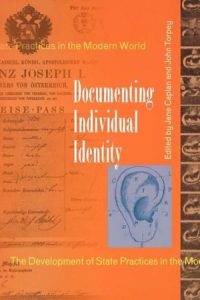Documenting Individual Identity: The Development of State Practices in the Modern World

Editor(s): Jane Caplan, John Torpey
Publisher: Princeton University Press
Year of Publication: 2001
Print Length: 392 pages
Genre: Non-Fiction / Political Science, Social Science, Academic Methodology & Methods
Area: Europe, France, Germany, The United Kingdom (UK), The Netherlands, Lombardy-Venetia (Modern Italy), Soviet Union, Russia, North America, South/Latin America, Argentina, Africa, Rwanda
Topic: History, Immigration Control, Movement of People and Ideas; Passport, ID, and Identification; Genetics, Biopolitics, Foreign/Migrant Workers, Technology & Surveillance, Mobility & Immobility, Politics & Power, Ethnic & Ethnicity, Racism, Imperialism, Organization, Borders, Citizenship, Identity; Modernity, Modernism, Modern; Governance, Culture & Society, Ethics; Law, Jurisprudence, Legal Theory
This book addresses one of the least studied yet most pervasive aspects of modern life—the techniques and mechanisms by which official agencies certify individual identity. From passports and identity cards to labor registration and alien documentation, from fingerprinting to much-debated contemporary issues such as DNA-typing, body surveillance, and the catastrophic results of colonial-era identity documentation in postcolonial Rwanda, Documenting Individual Identity offers the most comprehensive historical overview of this fascinating topic ever published.
The nineteen essays in this volume represent the collaborative effort of historians, sociologists, historians of science, political scientists, economists, and specialists in international relations. Together they cover a period from the emergence of systematic practices of written identification in early modern Europe through to the present day, and a geographic range that includes Europe, the Soviet Union, North and South America, and Africa. While the book is attuned to the nefarious possibilities of states’ increasing capacity to identify individuals, it recognizes that these same techniques also certify citizens’ eligibility for significant positive rights, such as welfare benefits and voting.
Unprecedented in subject and scope, Documenting Individual Identity promises to shape a whole new field of research that crosses disciplinary boundaries and is of broad public and academic significance. In addition to the editors, the contributors are Valentin Groebner, Gérard Noiriel, Charles Steinwedel, Marc Garcelon, Jon Agar, Martine Kaluszynski, Peter Becker, Anne Joseph, Kristin Ruggiero, Andrea Geselle, Andreas Fahrmeier, Leo Lucassen, Pamela Sankar, David Lyon, Gary Marx, Dita Vogel, and Timothy Longman
Table of Contents
Acknowledgments
Introduction
Part 1 Creating Apparatuses of Identification
Describing the Person, Reading the Signs in Late Medieval and Renaissance Europe: Identity Papers, Vested Figures, and the Limits of Identification, 1400-1600
The Identification of the Citizen: The Birth of Republican Civil Status in France
“This or That Particular Person”: Protocols of Identification in Nineteenth-Century Europe
Making Social Groups, One Person at a Time: The Identification of Individuals by Estate, Religious Confession, and Ethnicity in Late Imperial Russia
Colonizing the Subject: The Genealogy and Legacy of the Soviet Internal Passport
Modern Horrors: British Identity and Identity Cards
Part 2 Identification Practices and Policing
Republican Identity: Bertillonage as Government Technique
The Standardized Gaze: The Standardization of the Search Warrant in Nineteenth-Century Germany
Anthropometry, the Police Expert, and the Deptford Murders: The Contested Introduction of Fingerprinting for the Identification of Criminals in Late Victorian and Edwardian Britain
Fingerprinting and the Argentine Plan for Universal Identification in the Late Nineteenth Century
Part 3 Identification and Control of Movement
Domenica Saba Takes to the Road: Origins and Development of a Modern Passport System in Lombardy-Veneto
Governments and Forgers: Passports in Nineteenth-Century Europe
Many-Headed Monster: The Evolution of the Passport System in the Netherlands and Germany in the Long Nineteenth Century
The Great War and the Birth of the Modern Passport System
Part 4 Contemporary Issues in Identification
DNA-Typing: Galton’s Eugenic Dream Realized?
Under My Skin: From Identification Papers to Body Surveillance
Identity and Anonymity: Some Conceptual Distinctions and Issues for Research
Identifying Unauthorized Foreign Workers in the German Labor Market
Identity Cards, Ethnic Self-Perception, and Genocide in Rwanda

Jane Caplan is an academic and historian specialising in Nazi Germany and the history of the documentation of individual identity. She is currently Visiting Professor at Birkbeck, University of London, Visiting Professor of History at Gresham College and Emeritus Fellow at St. Antony’s College, University of Oxford.
Source: https://www.gresham.ac.uk/speakers/professor-jane-caplan
More from Jane Caplan in this library, click here.

John Christopher Torpey (born August 22, 1959) is an American academic, sociologist, and historian best known for his scholarship on the state, identity, and contemporary politics. Torpey is currently a professor of sociology and history at the Graduate Center, CUNY and director of the Graduate Center’s Ralph Bunche Institute for International Studies. From 2016 to 2017, Torpey served as the president of the Eastern Sociological Society.
Source: https://www.linkedin.com/in/johntorpey/
More from John Torpey in this library, click here.
